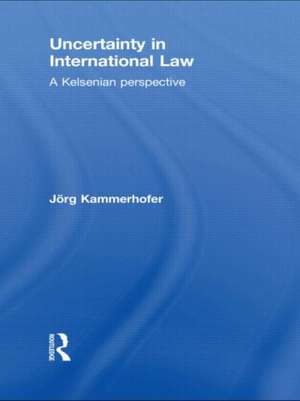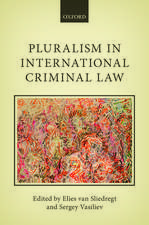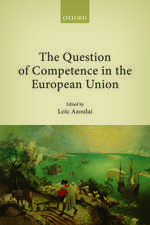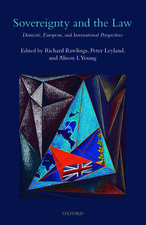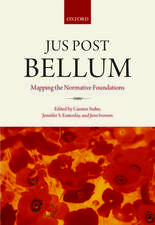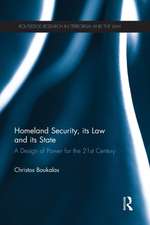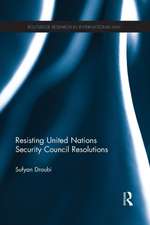Uncertainty in International Law: A Kelsenian Perspective
Autor Jörg Kammerhoferen Limba Engleză Paperback – 13 sep 2012
In viewing international law through the lens of Kelsen’s theory Jörg Kammerhofer demonstrates the importance of the theoretical dimension for the study of international law and offers a critique of the recent trend towards pragmatism and eclecticism in international legal scholarship. The unique aspect of the monograph is that it is the only book to apply the Pure Theory of Law as theoretical approach to international law, rather than simply being a piece of intellectual history describing it.
This book will of great interest to students and scholars of public international law, legal theory and jurisprudence.
| Toate formatele și edițiile | Preț | Express |
|---|---|---|
| Paperback (1) | 400.72 lei 6-8 săpt. | |
| Taylor & Francis – 13 sep 2012 | 400.72 lei 6-8 săpt. | |
| Hardback (1) | 1060.52 lei 6-8 săpt. | |
| Taylor & Francis – 7 iul 2010 | 1060.52 lei 6-8 săpt. |
Preț: 400.72 lei
Nou
Puncte Express: 601
Preț estimativ în valută:
76.68€ • 80.26$ • 63.82£
76.68€ • 80.26$ • 63.82£
Carte tipărită la comandă
Livrare economică 31 martie-14 aprilie
Preluare comenzi: 021 569.72.76
Specificații
ISBN-13: 9780415813518
ISBN-10: 0415813514
Pagini: 304
Dimensiuni: 156 x 234 x 16 mm
Greutate: 0.72 kg
Ediția:1
Editura: Taylor & Francis
Colecția Routledge
Locul publicării:Oxford, United Kingdom
ISBN-10: 0415813514
Pagini: 304
Dimensiuni: 156 x 234 x 16 mm
Greutate: 0.72 kg
Ediția:1
Editura: Taylor & Francis
Colecția Routledge
Locul publicării:Oxford, United Kingdom
Public țintă
Postgraduate and UndergraduateCuprins
1. Introduction 2. Self-Defence under the United Nations Charter 3. Customary International Law 4. Interpretation and Modification 5. Conflict of Norms in International Law 6. A Constitution for International Law 7. The Inevitable Grundnorm
Recenzii
‘Kammerhofer’s efforts to maintain theoretical consistency are impressive. He advocates a form of scholarship not afraid to carry its analysis through ‘to the bitter end’, and wants to oppose any form of pragmatism that would bow to what is convenient or realistic within the everyday ‘realities’ of international law.’ - Joshua Paine for Leiden Journal of International Law
"Uncertainty in International Law is a rich and nuanced book from which any reader interested in international legal theory will benefit. Moreover, in respect of the main substantive questions it deals with – self-defence, customary international law and interpretation and modification of treaties – the book displays a wealth of rigorous thinking that facilitates navigation through the complexities of legal indeterminacy"
- The European Journal of International Law, Mónica García-Salmones Rovira
"Uncertainty in International Law is a rich and nuanced book from which any reader interested in international legal theory will benefit. Moreover, in respect of the main substantive questions it deals with – self-defence, customary international law and interpretation and modification of treaties – the book displays a wealth of rigorous thinking that facilitates navigation through the complexities of legal indeterminacy"
- The European Journal of International Law, Mónica García-Salmones Rovira
Descriere
Re-engaging with the ‘pure’ theory of law which was proposed by Hans Kelsen and developed by the Viennese School of Jurisprudence, this book looks at the causes and manifestations of uncertainty in international law. The book considers both epistemological uncertainty as to whether we can accurately perceive norms in international law, and ontological uncertainty which occurs, it is argued, where two or more norms conflict. The book looks at these issues of uncertainty in relation to the foundational doctrines of public international law, including the law of self-defence under the United Nations Charter, customary international law, and the interpretation of treaties.
In viewing international law through the lens of Kelsen’s theory Jörg Kammerhofer demonstrates the importance of legal theory for the study of international law and offers a critique of the recent trend towards pragmatism in international legal scholarship.
In viewing international law through the lens of Kelsen’s theory Jörg Kammerhofer demonstrates the importance of legal theory for the study of international law and offers a critique of the recent trend towards pragmatism in international legal scholarship.
